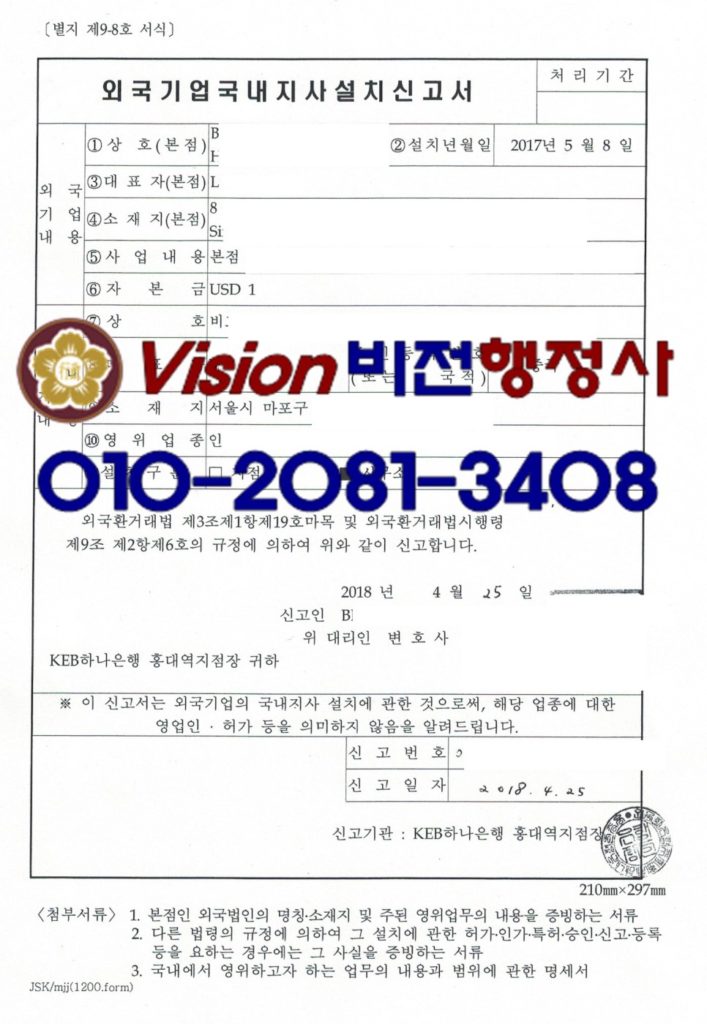
6월 24, 2021BY Admin

Alex Lee
ADMINITRATIVE AGENT I VISA EXPERT

Mickey Lee
ADMINITRATIVE AGENT I VISA EXPERT
[gravityform id=”98″ title=”true” description=”true”]
The visas that our vision administration company mainly assists in issuing are D8 visa (investment visa),
With D7 visa (resident visa), we mainly help foreign nationals who wish to stay in Korea for a long period of time with visa issuance.
The D8 visa is called an investment visa, and is mainly issued when starting a new business in Korea or being employed as an executive of an existing company and participating as an investor.
Since it requires at least 100 million won of investment funds, remittance from a foreign country must be preceded, and it is almost impossible for an individual to prepare due to the complicated documentation and process, it is usually requested by an administrative agency to obtain a visa.
The D7 visa is a resident visa for foreigners to work in Korea for foreign professional staff of foreign headquarters or foreign companies.
In this article, I will explain the subjects of the D7 visa, its features, and the difference between it and the D8 visa.
| Characteristics of D7 Visa |
The D7 visa is basically a visa that a foreigner of a foreign company can get to dispatch to a branch in Korea, that is, to work in Korea.
If you meet the following conditions and do not meet the D8 corporate investment qualification, you may be issued a D7 visa.
When a foreign public corporation, public institution, organization, or a person who has worked for more than one year at the head office is dispatched as a required domestic professionalWhen a foreign public corporation, public institution, organization, or a person who has worked for more than one year at the head office is dispatched as a required domestic professional
(For domestic dispatch, examples include affiliates, branch subsidiaries, and liaison offices for overseas headquarters.)
A corporation listed on the KOSDAQ, KOSPI, or a foreign corporation established by a public institution
When a foreigner who has worked for more than one year is dispatched to the head office located in Korea to provide or receive training in skills, knowledge, etc.
※ Basically, at least one year of experience in a foreign company is required, but it can be exempted if you are operating a national project led by the state or approved by an immigration officer.
Representative examples of required professional manpower are as follows.
임원(EXECUTIVE)
A person who primarily directs organizational management within an organization, exercises extensive authority in decision-making, and receives only general direction/supervision from the board of directors and shareholders as the highest-ranking executive of the company (executive officers are those who work cannot be performed directly)
상급관리자(SENIOR MANAGER)
Responsible for establishing and implementing the goals and policies of the company or departmental unit, has the authority for planning/direction/Kim Dok, the right to hire and dismissal of employees, or the right to recommend it, and is responsible for the establishment and implementation of the goals and policies of the company or departmental unit. A person who determines/supervises/controls work or exercises discretion in day-to-day work (the supervised does not include a front-line supervisor who is not a professional service provider, nor does it include a person directly engaged in the provision of services)
전문가(SPECIALIST)
Highly specialized and essential for research/design/technology/management of the company’s service A person with exclusive experience and knowledge
| Differences D7 Visa, D8 Visa |
As mentioned earlier, the D8 visa is a visa issued to foreigners to invest in companies. Therefore, the basic purpose is different from the D7 visa dispatched to the liaison office and branch. Therefore, the biggest difference is the difference in the type of entry into the country.
In the case of the D8 visa, a foreign investor directly invests in a Korean company and is issued a visa, so it is the main company.
It has the characteristics of a domestic corporation, mainly by establishing local corporations and sole proprietors in Korea.
On the other hand, in the case of the D7 visa, foreign corporations are required to establish a branch or liaison office in Korea.
Because it is a visa that is issued, it has the character of a foreign corporation.
At this time, if you plan to conduct business activities that generate profits in Korea, you can set up a branch of a foreign corporation and operate it with a manager,
A liaison office may be established and operated if only limited activities such as market research, business liaison, and R&D are conducted, not sales activities.
In addition, the D8 visa, which invests in domestic corporations and private companies, is obligated to pay tax on all domestic and foreign income, but
In the case of a D7 visa, which is operated by a foreign company by establishing a branch, only domestic source income is subject to tax payment.
Lastly, unlike the D8 visa, which requires a minimum investment of 100 million won, the D7 visa has no investment limit.
| Types of D7 Visa |
There are a total of four types of D7 visas, and they are broadly classified into four types according to the subject of application and the scope of activities.
First, there is the foreign company expatriate visa, D7-01.
A person who has worked for at least one year at the head office, branch, or other business place of a foreign public institution, organization, or company
It is dispatched as essential professional manpower to its affiliates, subsidiaries, branches or offices in Korea.
This visa is for working people. Required documents include a dispatch order or permission to establish a liaison office;
A report receipt, performance of operating and operating funds, tax payment results, and an operation plan for new branches are also required.
Second, there is the D7-02 visa for expatriate employees of domestic companies.
A person who has worked for more than one year at an overseas local corporation or overseas branch established by a domestic listed corporation or public institution
It is dispatched to its head office or head office in Korea to provide professional knowledge/skills or functions, or
This is a visa for those who want to receive training. Required documents include a certificate of non-existence of registered matters from the head office,
Overseas remittance confirmation documents, business registration certificate of overseas branch, tax payment certificate of the head office, personnel order, dispatch history, etc. are required.
Third, there is the FTA transfer expatriate visa, D7-91.
This visa is for transferees within a company according to the contents of a free trade agreement (FTA).
Fourth, there is the FTA contract expatriate visa, D7-92.
According to the contract between the parties of the free trade agreement (FTA),
employees belonging to the company of one country
This visa is for those who are dispatched to the Republic of Korea to supply or support contract services.
The above was a brief introduction to the D7 visa.
Documents required for issuance may differ from person to person, so we recommend that you consult by phone first.
Because this vision administration office can communicate without problems in English, Japanese, and Chinese,
Even if you cannot communicate in Korean, we can help you with visa issuance.


